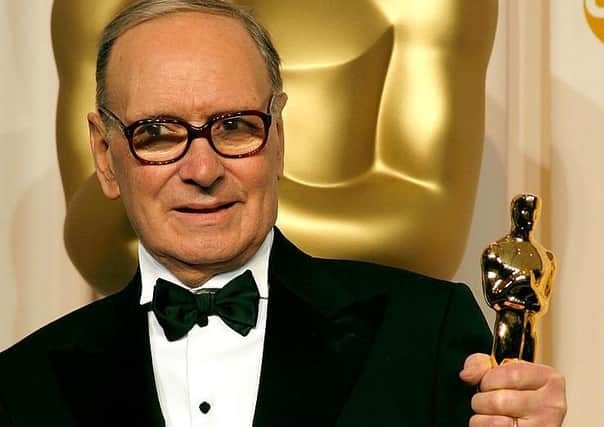Obituary: Ennio Morricone, maestro behind ‘spaghetti western’ soundtracks


It was lack of money that prevented the young Ennio Morricone from using a full orchestra for a low-budget western, shot in Spain back in 1964. Instead he used trumpet, Jew’s harp and Fender electric guitar, with lots of vibrato, and human voices as if they were instruments, along with whistling, gunshots and horses’ hooves. Three years after it was made, the film surfaced in the UK and US under the title Fistful of Dollars. And nothing was ever the same again.
The film was an international hit, sparking a tidal wave of similar, violent “spaghetti westerns”, with Italian money and Spanish locations. And Morricone’s soundtrack was to prove enormously influential. Morricone went on to compose the music for around 500 films, from low-budget Italian horror movies to big-budget Hollywood epics, and was regarded as one of contemporary cinema’s greatest composers – though Morricone had no truck with the phrase “one of”. His official website baldly proclaimed: “Ennio Morricone is rightly considered the world’s greatest living film composer”.
Advertisement
Hide AdAdvertisement
Hide AdJournalists and film-makers who visited him in his palatial apartments overlooking the Piazza Venezia in Rome were warned not to be so familiar as to call him Ennio, or even Mr Morricone. The correct form of address was Maestro.
He collaborated with some of Europe and America’s greatest directors, including Bertolucci, Pasolini, Polanski, Tornatore and John Huston, mixing classical, folk and avant-garde elements to produce highly evocative “soundscapes”. His music could signal the psychology of a character or the passage of time. It was music full of beginnings and endings. In Cinema Paradiso it was gentle, wistful and nostalgic, while his score for the 1986 movie The Mission echoed the glory and tragedy of the Roman Catholic Church in its determination to take the Word of God to hostile South American natives.
He reckoned he should have got an Oscar for that one. “A big mistake on the part of Academy,” he said. He lost to Herbie Hancock, who composed the music for the jazz film Round Midnight and claimed the decision to give the award to a black composer was political. On another occasion he called it “theft”.
Quentin Tarantino reused his music in several of his films and lobbied him to write an original score. Morricone was finally persuaded and won a long overdue Oscar for The Hateful Eight in 2016 - before reportedly dismissing Tarantino as a “cretin” and his films as “trash”. Morricone claimed the comments were a fabrication and the interviewer did admit to some “terrible mistakes”. Morricone refused to learn English, so proceedings were often conducted through an interpreter. It was an odd business.
Born in Rome in 1928, Morricone was the son of a jazz trumpeter. He was only two months older than Sergio Leone, the director of the Dollars trilogy, and they met at primary school. Morricone went on to the prestigious Santa Cecilia conservatory. During the second half of the 1940s he composed several classical works for voice and piano. In the 1950s he began writing and arranging music for radio dramas. He played trumpet in a jazz band, wrote and arranged pop songs and worked with Mario Lanza.
Peter Tevis was a young American folk singer who was living in Italy in the early 1960s. Morricone did an arrangement for him of the song Pastures of Plenty by the great American dustbowl troubadour Woody Guthrie. The original is fairly characteristic of Guthrie, including the line “We come with the dust and we go with the wind.” The Tevis recording is a more elaborate arrangement, with a backing chorus adding a soaring vocal, at times wordless, at other times repeatedly chanting “weeth the wind” in a heavy Italian accent.
Leone heard the rearranged version and it duly became one of the main pieces of music in Fistful of Dollars, minus the Tevis vocal, though the line “weeth the wind” can still be heard at points. Leone already had at least some of Morricone’s music before shooting the film and it seems he tailored scenes to suit the music. “He often kept the scenes longer simply because he didn’t want the music to end – that’s why the films were so slow,” said Morricone.
The Dollars trilogy – Fistful of Dollars, For a Few Dollars More and The Good, The Bad and The Ugly – made Clint Eastwood into a major star and prompted a flood of “spaghetti westerns”, with music that was either written by or heavily influenced by Morricone. Hugo Montenegro and his Orchestra’s recording of The Good, The Bad and the Ugly topped the British singles charts in November 1968.
Advertisement
Hide AdAdvertisement
Hide AdMorricone and Leone reached even greater heights on the western epic Once Upon a Time in the West (1968) and the richly detailed and narratively complex Jewish gangster movie Once Upon a Time in America (1984), the soundtracks of which showed greater maturity and musical and emotional range.
Between 1980 and 2016, Morricone won six BAFTAs, for Days of Heaven, Once Upon a Time in America, The Mission, The Untouchables, Cinema Paradiso and The Hateful Eight. When he finally won an Oscar at 87 for The Hateful Eight he became the oldest winner in any regular category (though James Ivory was two years older when he won a screenplay award two years later).
Such was Morricone’s impact not just on film music, but on culture that The Ramones and Metallica borrowed music from The Good, the Bad and the Ugly to serve as introductory music for concerts. Morricone is survived by his wife Maria, to whom he was married for more than 60 years, and by four children.
Comments
Want to join the conversation? Please or to comment on this article.